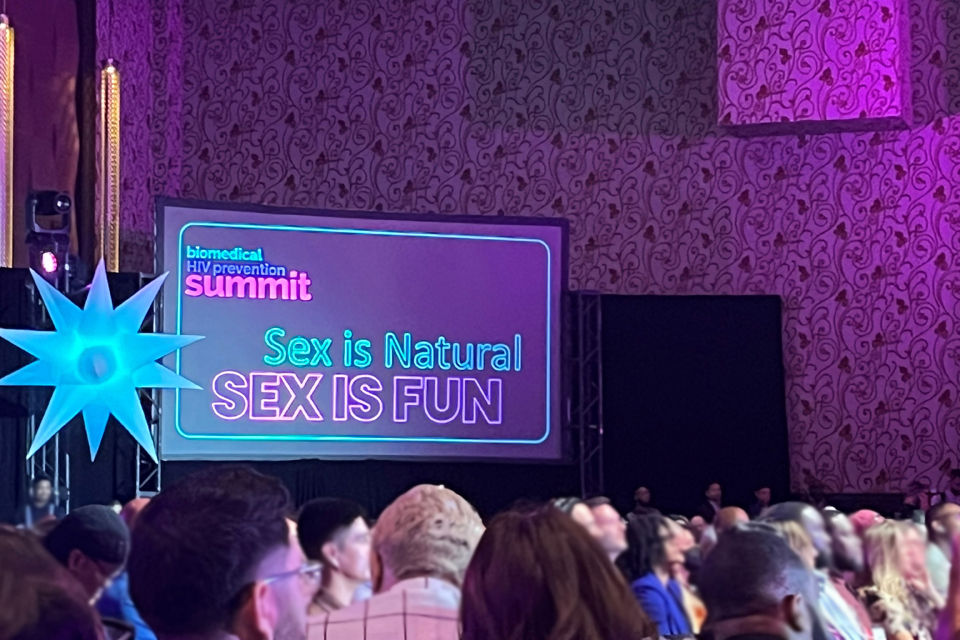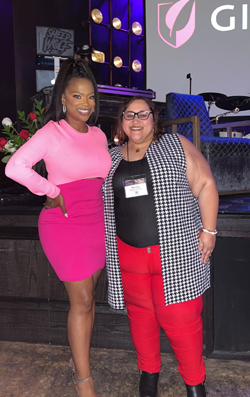By Marissa Gonzalez
The agenda for the 2023 Biomedical HIV Prevention Summit in Las Vegas, Nevada, in April promised a gathering that would "lean into sex and pleasure. Since sex is the main way that HIV is transmitted, we need to focus on consensual sex in all of its iterations." The Well Project's community advisory board chair was in attendance at the summit; you will learn from her session summaries below that the event did not disappoint!
Table of Contents
- Opening with a Bang
- Sex, Baby: Let's Tell Stories About You and Me
- A Private Reception for Southern Women
Opening with a Bang
The first plenary of the summit consisted of an opening blessing, a Vegas-style performance that included two women with an elevated hula hoop, and seven speakers. These talks were short but packed a powerful punch. Jubilation was the word to keep audience members engaged and involved. Before and after each speaker, the host would shout "Jubilation!" and the audience cheered and shouted in honor of the speaker who just shared, and in support of the next speaker.
There was no shortage of conversations geared towards sex, pleasure, PrEP, and a few things in between – including visuals! Speakers were escorted up by two handsome males practically in their birthday suits, but don't let this distract you from the message at hand.
During this opening session we learned that ONLY 240,000 individuals are actively using PrEP and there is a goal for inclusion where 50 percent of users identify as Black and 20 percent identify as Latin. There was also strong expression that cisgender women are not represented as needing PrEP, and there were calls for greater visibility and representation of cis women, especially women of color, in PrEP campaigns and media. There was a beautiful yet overwhelming focus on women – overwhelming used in the context of IT'S ABOUT DAMN TIME.
Some other points mentioned that I believe are important to highlight are:
- The field needs to lead with pleasure when talking about sexual health
- We as individuals need to be mindful of partner shaming because it furthers stigma. Allow your partner to openly and comfortably express what they like and who they like! "The prostate is there for a reason"!
- Cis women need to reclaim their sexuality! Stop feeling ashamed or intimidated, get out our heads and "clean that shit out"
- The sex conversation should be as normal as undressing. Asking questions: When's the last time you had sex? What do you and don't you like? Do you know your status? – because I know mine.
- Sex is meant to be fun and/or a spiritual connection. Decide which one you're going into and enjoy it.
- "Know who you are, don't forget who you are and own your shit!"
- Share factual info on U=U (Undetectable Equals Untransmittable)
- Conversations on "risk" – it's been the same conversations and nothing is changing
- Pleasure-based strategies as viable means of prevention
- Providers and clinical workers should ask "How can I support you in feeling good"
- Making HIV healing centered – trauma affects people
- "High risk" language creates stigma
- Change the narrative; PTSD = Prevention That Supports Desire
- Our pleasure is not high risk
- Stigma is a form of social control
- Our identities are HIV prevention
- Our joy is HIV prevention
- HIV lives with me; I was here first!
Sex, Baby: Let's Tell Stories About You and Me
This session focused on the narrative of HIV in the media and the stories that are told – but first they set the tone by ensuring we created our own narrative. Keeping the theme of sex and pleasure, we were asked to think back to our last sexual experience – "My Last Moan." The instructions were to think of the last time you had sex with someone(s) or yourself. We were then directed to write one sentence, two sentences with descriptions, or to make it as long as we wanted with dialogues. We were then encouraged to share and my oh my, HIV does not mean you do not have good, pleasurable moments!!! This was a good reminder given the negative narratives we would then reflect on during our time together.
Several categories were looked at including memoirs, theater, television, documentaries and such. There was significant conversation on how folks felt about And the Band Played On, The Chimp and The River, Rent, Angels in America, 13 Reasons Why, Dallas Buyers Club, The Normal Heart, Paris is Burning, and How to Survive a Plague. We talked about the fact that in many of these, HIV was not viewed as a universal problem; why advances such as U=U are not talked about; and how HIV is a money-making industry yet after 40 years there is still no vaccine or cure.
Before the question could be asked, an older gentleman chimed in, addressing younger folks who led the session, that there were so many monumental pieces missing. He pointed to Philadelphia, Life Support, and ACT UP.
What else do you believe was left out?
The session ended with encouraging us to use storytelling through our advocacy, and consider what we want to see portrayed in the media. One commentator closed expressing their desire to no longer see HIV presented as a plot twist but instead as part of narratives of love, support, and growth.
As an advocate, what narrative does your story share?
A Private Reception for Southern Women
A private reception was held during the 2023 Biomedical Conference for women who are part of the 2023 Southern AIDS Coalition cohort of Gilead's Creating Possible Fund. To our surprise, multi-hyphenate celebrity Kandi Burruss was the moderator for the conversation with executive director Dafina Ward. Not only has Kandi used her platform to break the taboo against women in business expressing the sexual aspects of their identity, she has also taken a keen interest in HIV and how women in Black and brown communities are impacted. The questions focused on were:
- How to create change within the culture of Black and brown communities, among youth, and in other areas that impact women such as domestic violence victims/survivors;
- How social media impacts the narrative and the misinformation we must combat;
- How conversations around sex, sexuality, and gender identity are closeted and stigmatized;
- Where and how to create safe spaces for these conversations to occur; and
- Do men have a responsibility of sex-education positivity towards women? and where do they fit into the conversation?
This final question was given to the audience and related to expecting Black and brown communities to end racism: Can women by ourselves end misogyny? It was emphasized that men have a role in creating space and community where it is unacceptable to be disrespectful to women or for women to be hypersexualized. However, we also discussed what conversations are being had with young women in regards to standards, their worth, and what they will allow or endure when communicating with or in a relationship. Conversations and experiences at a young age generally hold bearing in our lives as we get older and are faced with certain circumstances.
Some time was also spent on views of contraception, condoms, and PrEP versus things such as the HPV (human papillomavirus) vaccination – why the HPV vaccination is widely and culturally accepted, yet these other things are not. Many good questions were raised, and the session allowed for deeper thought around areas within our cultures where there may be opportunity to have conversations and create a normalcy around these topics with older and newer generations.
Learn more about The Well Project's SHE/HER/THEY (Sexual Health Education/HIV Empowerment Resources/Treating HIV Equally) programming - a multifaceted educational outreach initiative focused on improving engagement in care, health outcomes, and well-being for women living with and vulnerable to HIV while promoting a culture of wellness, through a holistic and non-stigmatizing lens






